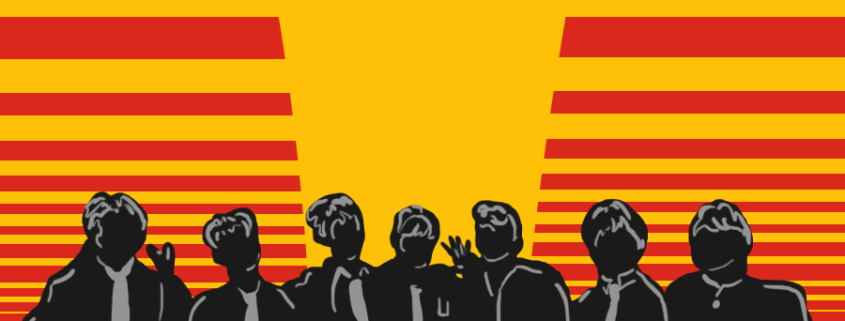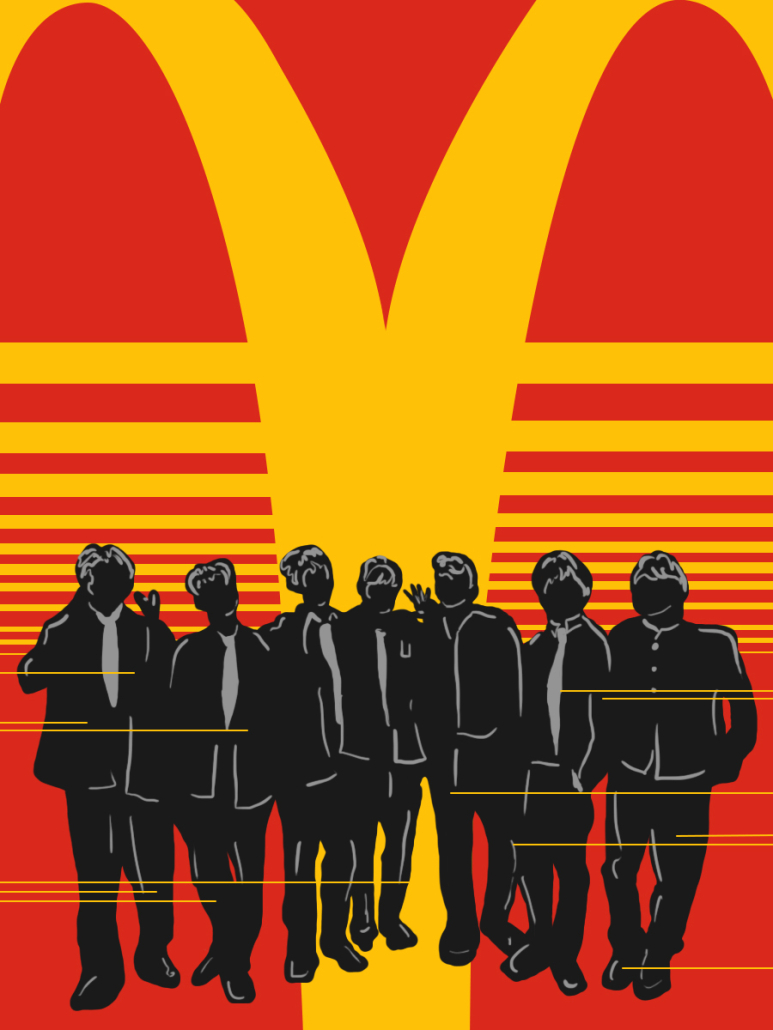Byte of Life: Breaking down the BTS Meal — from boy bands to burgers
The BTS Meal — a novel collaboration between K-pop’s poster child, BTS, and American fast food’s timeless older brother, McDonald’s — launched in the United States May 26 and consisted of 10 chicken nuggets, two sauces, medium fries and a medium coke.
One might dismiss the BTS Meal as a cheesy marketing tactic to sell pre-existing menu items at a higher markup. Upon closer inspection, however, this glorified Korean 10-piece meal combo signals much more than just flavors of chili and cajun. McDonald’s BTS Meal is a unique tale of fans, the music industry and globalization.
Within the last year, BTS took the Western market by storm. Their English hit single, “Butter,” set five new Guinness World Records, surpassing “Dynamite” for the most views on a music video premiere on YouTube — 3.9 million concurrent viewers. Several months ago, BTS made Grammy history by being the first K-pop group nominated for best pop duo/performance group. They were also the first K-pop group to debut at the top of Billboard’s Hot 100.
Of course, the fans — called ARMY — are the drivers of BTS’s worldwide success. But how did an authentically K-pop act manage to grab the spotlight in a particular sounding American hip-hop market? I’m not a K-pop expert, so I decided to turn to Victoria Chan, music lover and fellow writer at Daily Trojan, who has followed BTS since its early eras.
According to Chan, BTS’s music is catchy, but it isn’t the main ingredient behind the group’s success.
“What makes BTS different from American artists is the personal connection they create with the fans,” Chan said. “If you’ve seen them on Korean variety shows and interviews, they’re super authentic, humble and extremely funny. You can just watch a clip of them on YouTube or on TV and immediately feel happier.”
Other BTS listeners’ experiences support Victoria’s perspective. In an SF GATE interview, psychiatric nurse practitioner Carolain Peregrino noted BTS’ impact on helping her clients cope with depression and balance negative emotions.
“[In ARMY], you start to meet other people online who actually were saved by BTS, and they talk about it. ‘They saved me from depression.’ ‘My daughter had cancer and they saved me,’” Peregrino said.
This message of positivity and vulnerability is clearly visible in the album names and their songs’ lyrics. The BTS Meal practically solidified their brand as a household name among Western audiences.
The BTS Meal was actually so successful that a secondary “drop” market was created for it. The demand for the meal was so high that several McDonald’s in Indonesia had to temporarily close down. On eBay, people sold BTS Meal bags and sauces for more than double the original price. According to Business Insider, customers purchased listings for these bags and sauces at more than $44.
Worldwide, hardcore fans preserved their meal bags by framing them, turning them into phone cases and housing decor and even creating clothes with them. Economically, the BTS Meal is a unique example of a cheap, disposable product becoming a luxury item over a short period of time.
From a marketing perspective, some argue that the BTS meal even redefined fast food marketing, by showing audiences that even global pop stars can enjoy nuggets and sweet chili sauce once in a while. The collaboration itself was McDonald’s first international marketing campaign and a symbol for globalization and the interconnectedness of both food and music.
Furthermore, McDonald’s became the essential face of celebrity partnerships: They used celebritism to increase the perceived value of food, and they used food to create a more personal connection to the artist: “If this is Saweetie’s go-to order, you can BET that I am ordering this too!”
Considering the global dominance of BTS, some argue that BTS — and K-pop as a whole — could be losing its roots. Some die-hard fans claim that, in their quest to break into the Western market, BTS abandoned the “K” in K-pop. Indeed, they sung their two latest most popular hits, “Butter” and “Dynamite,” completely in English, which challenges the boundaries of whether they qualify as “Korean pop” or just “pop.”
“While BTS has remained authentic and humble throughout the years, their sound has noticeably changed,” Chan said. “The beat and production of many [of their] songs are more similar to Western pop music.” There is much debate regarding whether or not BTS is vying too heavily for white validation.
While the K-pop genre isn’t purely Korean, I believe the Westernization of BTS’s music isn’t necessarily a negative thing. For one, it is undeniable that K-pop’s reach drastically expanded before “Dynamite” and “Butter.” I wouldn’t have enjoyed annoying my friends by terribly singing some of their iconic songs if it were not for my introduction to BTS through “Dynamite.”
Secondly, music in every country borrows from each other. No genre is completely pure. Rock music borrows from African American gospel music, modern hip-hop borrows from Latin rhythms and even English baroque music borrows from Roman compositions. Music is a medium that evolves while maintaining its roots.
Although the BTS Meal situated BTS as the undisputed global leader in the Korean music industry, their spot at the top is constantly challenged by other, newer groups in the industry. Victoria believes that in 10 years, its members may go on to pursue solo careers.
While their popularity will not last forever, BTS impacted the global music industry by making strides for Asian representation in Western markets. They’ve broken records, established a global legacy and will continue to be appreciated — or criticized — by listeners. Thirty years later, the BTS Meal might even be a luxury K-pop artifact.
Miguel Mercado is a sophomore writing about the impacts of technology and economics on 21st century college students. His column, “Byte of Life,” runs every other Tuesday.


